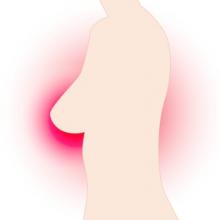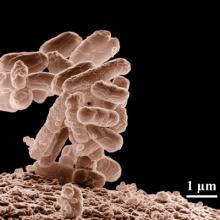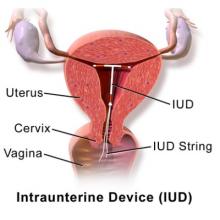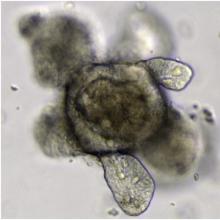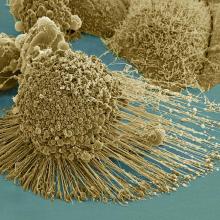Newsroom
1/5/2018
As the director of a cancer education project, I frequently get questions from friends, family members and others about people diagnosed with cancer. Hopefully this advice will be helpful to others. Note that I am not a medical doctor of any kind. I am a PhD. I do not give medical advice on cancer… more
1/3/2018
Cancer survivors often go through many different treatments, including radiation and chemotherapy drugs. These treatments are often successful in getting rid of cancer, but some negative effects can last a lifetime. The life expectancy for cancer survivors is 30% lower than those who have not had… more
1/2/2018
New research from researchers at Mt. Sinai Medical Center may change the way we understand how cancer spreads (metastasizes). The study looked at how very early breast cancer spreads. Even before a tumor was visible, changes in immune cells called macrophages lead to movement of breast cancer… more
12/27/2017
A study of 650 Europeans followed for 10 years suggests that eating more fruits and vegetables, particularly tomatoes and apples may help keep the lungs healthy. Those people with increased intake of these foods showed better lung function, and it appears that the diet was able to help repair lung… more
12/18/2017
So, e-cigarettes are supposed to help people quit smoking, right?
The opposite may be true.
A study of 915 U.S. adults compared people who used e-cigarettes with those that didn't. E-cigarette users were much more likely to start smoking tobacco within 18 month. For those who did not vape, 10.2%… more
12/15/2017
Cancer treatments are designed to kill cancer cells. Seems pretty simple, but it isn't. When cancer cells die, they can cause inflammation, and chronic inflammation supports the growth of cancer.
What can be done about this?
Researchers from Harvard and the Institute of Systems Biology have found… more
12/13/2017
Breast cancer treatments often cause side effects for women, and some of them can last for years. Some of these effects are due to the effects of the drugs on the production and activity of estrogen. Research published in the journal Breast Cancer Research has shown that women who ate more… more
12/12/2017
Kentucky has one of the highest smoking rates in the U.S. A study by the University of Kentucky looked at 20 years worth of information and showed that people living in counties with smoke-free workplace laws have lower rates of lung cancer. Less smoke - less lung cancer. Most cancer is… more
12/11/2017
It would be great if there was an inexpensive, approved, non-toxic treatment for cancer. An international team of investigators has identified just such a drug. The chemical, N-acetylcysteine (NAC) is an antioxidant that is used to treat colds and other conditions. The researchers gave early-… more
12/8/2017
A study of medical professionals with colon cancer showed that intake of more fiber was linked to better survival, both from their cancer, and overall. A benefit was also seen in patients that increased their fiber intake AFTER their diagnosis. The type of fiber mattered. Patients who got their… more
11/17/2017
Bacteria live on us and in us. We are starting to learn just how much of our biology and health they control.
Gut bacteria have now been linked to the development of cancer and some of them seem to be able to control how cancer cells respond to chemotherapy. Research with colon cancer has shown… more
11/16/2017
Research at the Winship Cancer Institute of Emory University has demonstrated that getting weekly massages leads to reduced cancer-related fatigue. The study included 66 women with stage 0-3 breast cancer. Those women who got weekly massages reported clinically significant changes in their quality… more
11/15/2017
A study that included 12,000 women from around the world has found that using an intrauterine device (IUD) is linked to a reduced risk of cervical cancer. The study was not able to show that the use of IUDs actually caused the reduction, but the association was strong. Women who used IUDs had a… more
11/14/2017
Digital pills?! The U.S. has approved the use pills that contain a tiny digital device. The purpose is to track the whether or not patients are taking their medications when they are supposed to. When the pills containing the device enter the stomach, the acid in there causes a very small electric… more
11/10/2017
What is the best way to study human disease? Cells? Animals? How about human organs that are grown in the lab?!
Amazing breakthroughs have made it possible to grow 'organs' from just a few cells. Researchers have created models of breast, lungs, and the digestive system, among others. These '… more
11/7/2017
There is definitely strength in numbers! Researchers at the Georgia Institute of Technology have developed a computer program that analyzes genetic information from cancers to predict the effectiveness of different drug treatments. Importantly, they want to share their work (and code) with… more
10/31/2017
When one has cancer, 'trial' can sound like a scary word. Often, patients avoid trials because they want to take a treatment that has already been approved. The reality is that sometimes, trials offer the best hope for patients. It is very important to look into possible trials when choosing… more
10/28/2017
Breast cancer is often treated with both surgery and radiation therapy. New research has suggested that the order of these treatments may impact patient outcomes. A study published by the Moffitt Cancer Center found that breast cancer patients who underwent radiation therapy prior to surgery were… more
10/27/2017
A study from Washington University School of Medicine in Saint Louis has shown that men with low-risk prostate cancer might be better off choosing observation of the tumor rather than surgical removal. In the study group, men diagnosed with low-risk prostate cancer who had surgery to remove the… more
10/25/2017
On this day, 15 yrs ago, the CancerQuest website was launched. Because of the support of friends and family, and the work of our staff, and volunteers, we are able to provide evidence-based cancer information to empower patients, their caregivers, and students across the globe. Thank you all!



